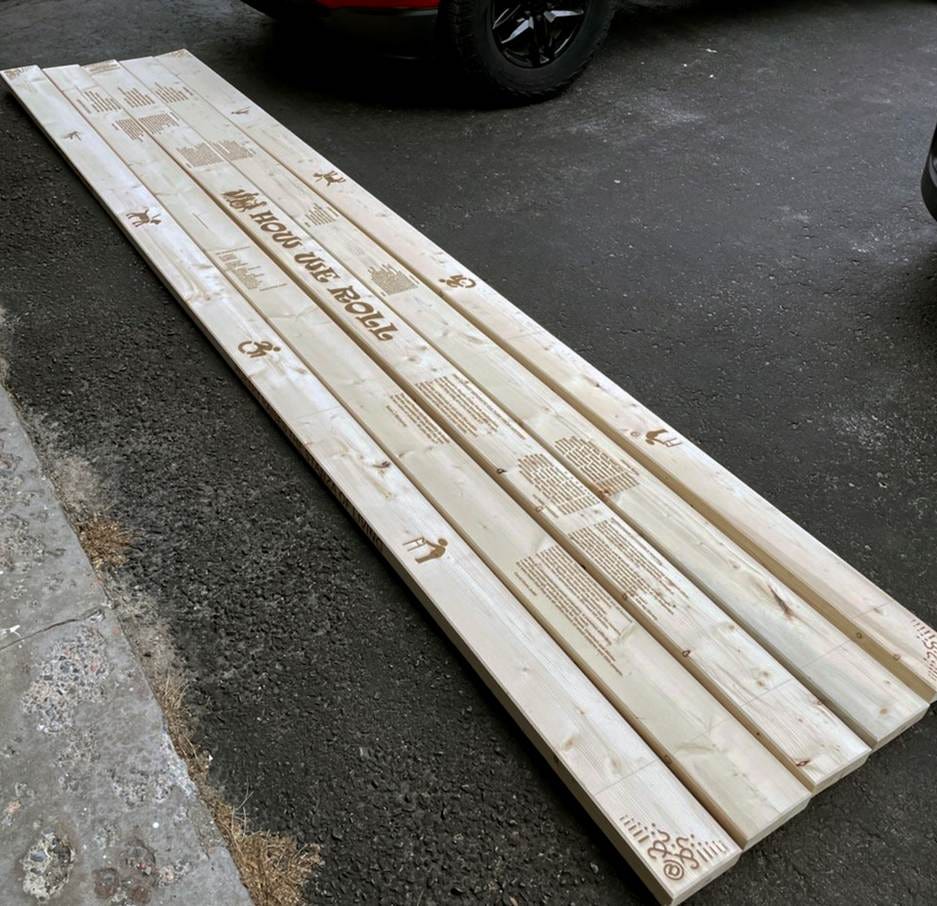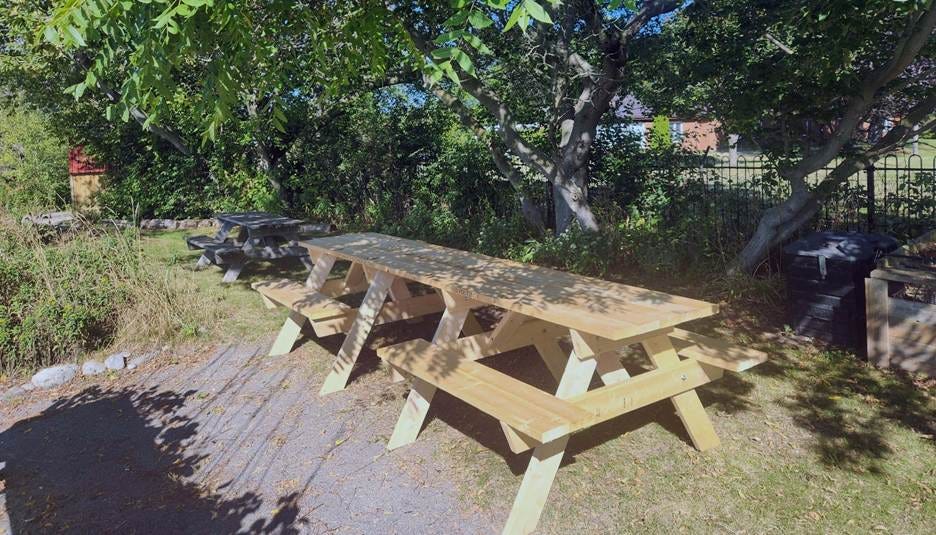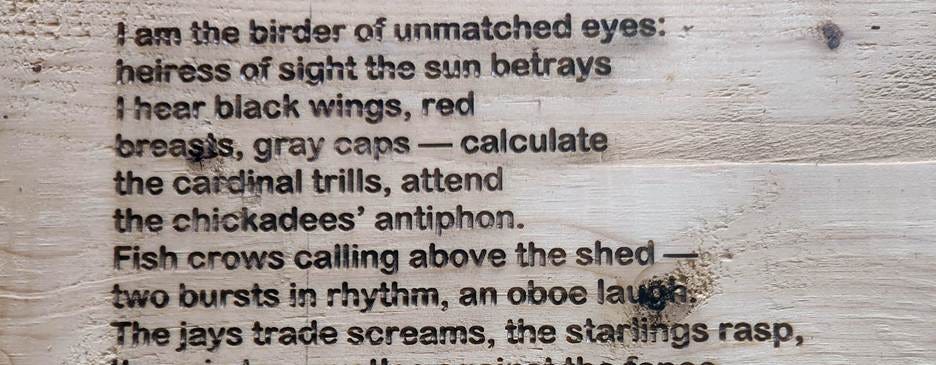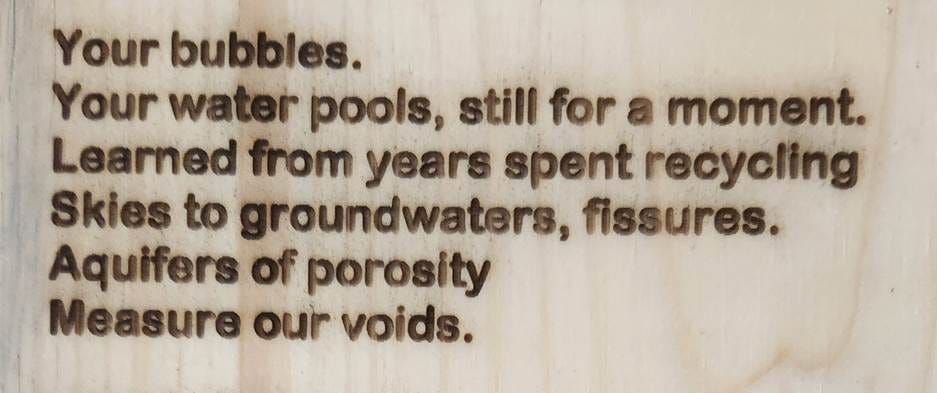HOW WE ROLL
Able Poetry composed by the 'Disabled'
This image of the tabletop laid out on the workshop floor before heading to Cobourg’s picnic table assembly centre.
Well, it’s done, the accessibility table, the world’s first accessibility picnic tabletop containing the well-abled poetry of disabled poets from USA, Scotland and Canada. It was a task in every sense of the word – it took two takes. Currently, the table is nestled in its new home, the accessibility section of the Cobourg Ecology Garden.
Carol Anne Judd was the curator for this table; she is more than a disability, but an exquisite vocalist, poet, multi-faith minister, nurse, all informed with a fine sensibility for the creative arts. Her reach for poetry was local, national, and international; all appropoetically brought together on one table, eloquence, articulation of voices seldom heard.
The table was unveiled September 3 on a warm sunny afternoon as part of the People’s Republic of Poetry’s project, Picnic On Poetry. Poetic tapestries were laid out on several tables with a wonderful picnic spread designed by The Market & Smør. Organic air conditioning provided by a natural blend of breeze skipping off the surface of a great lake.
(Our Poemtown has an unique downtown consisting of a typical old retail area dominated by the majestic Victoria Hall, a spacious recreational safe harbour for training kids about watercraft, a premier Victoria Park and sandy beach for tourists. Also downtown is a meadow, A Meadow! It is appropoetic that the Cobourg Ecology Garden acts as both concierge and sentry.)
Now let’s introduce the poets and their poems that have been etched into this tabletop. Here’s the opening lines of a splendid poem, AUDIENCE by Sandra Alland currently residing in Glascow, Scotland and who has visited Cobourg on multiple occasions of artistic events.
There is music that echoes from poetry scorched into wood and from wood formed into a cello. Emily K. Michael adorns the table with her poem, CELLO, which reaches into the soul of sheltering trees;
Emily is a blind poet, musician, and writing teacher living in Jacksonville, Florida. She is the poetry editor for Wordgathering: A Journal of Disability Poetry and Literature at Syracuse University.
Her insightful words, “I borrow Milton’s words and ‘consider how my light is spent.’ I reflect on my abilities, perception, and experience – and find ways to direct that light outward, to nurture a spirit of genuineness, imagination, and empathy. I write about my disability because I value that experience. As a writer, I draw from my life because it is mine. I write about disability because there aren’t enough voices talking about disability in a way that encourages people to acknowledge our equal share in humanity. My experience is valuable because it is a different perspective among people who are equally different.”
Emily wrote the poem, BACKYARD BY EAR, detailing the rich and ululating audioscape of a backyard. A deficiency in one sense (sight) is often accompanied with a heightened other sense (hearing). Any back yard is a cacophonous symphony as poetically captured by Emily. Just close your eyelids and listen and listen and listen, just listen as long as you can without opening your eyes.
Sean J Mahoney introduces himself; “I have had work published at Poets Reading the News, The Good Men Project, Nine Mile Literary Magazine, and Wordgathering among others. I write when I need to. I write when…anything. I live in Santa Ana, California with Dianne, her mother, 3 dogs, and 4 renters. There is a large garden and two trees with big bitter oranges that look more lemon-like. I run the Disability Literature Consortium booth at the annual AWP bookfair.”
Sean’s poem, ONE CANNOT SEPARATE CULTURE FROM HISTORY, engages the notion that disability is not restricted to individuals, but includes government, society, culture.
The Last Poets reciting poetry to beats
And the question for you and I my love
In our ruins of shame: do you dig us?
Of course, the question is, do you notice us? As the 21st century unfolds, the voices are beginning to be heard. Sean doesn’t offer comfort, but brutal insight. He continues with another poem, THE VENUS OF WILLENDORF;
Carol Anne Judd provided one of my favourite poems of hers. It illustrates a simple dilemma for a wheelchaired person facing the bookshelves of poetry in the World’s Biggest Bookstore. Her poem,
WHEELCHAIR ACCESSIBILITY POETRY, opens…
Carol Anne Judd blind-sided me with this project. And this, after I had already announced her curatorship of the world’s first Accessibility Poetry Table. Surprisingly unexpected, she asked for a poem from me. She has known me for years, and recently I need a mobility scooter. My Lamborghini legs have become jalopies. So I had to face my predicament. The poem is called DISSING ABILITY
Ability: run, jump, leap, FREEDOM
Ability: skate, tumble, sing, FREEDOM
Ability: hear birds, smell lilacs, FREEDOM
Ability: escape custody, dive, FREEDOM
Ability: somersault, see beauty, FREEDOM
Ability: give voice, climb trees, FREEDOM
Ability: climb cliffs, run rapids, FREEDOM
Ability: trampoline, pirouette, FREEDOM
D I S < = = = = = =
DISadlliyt: trampoline, pirouette, feedom
DISbialtiy: climb cliffs, run rapids, feedom$
DISabliity: give voice, climb trees, feedom$
DISabiltiy: somersault, see beauty, feedo$$
DISability: escape custody, dive, feedo$$
DISadility: hear birds, smell lilacs, feed$$$
DISability: skate, tumble, sing, feed$$$
DISadility: run, jump, leap, FEE$$$$
A big thank you to all the poets engaged in this project and for providing voices and insights seldom heard or known. Welcome to Cobourg: Canada’s Poemtown.
POETRY RAISES THE STANZA OF LIVING










Fabulous write up of an incredible project! I can't wait to check this table out in person. Poemtown is so fortunate to have you, Wally!